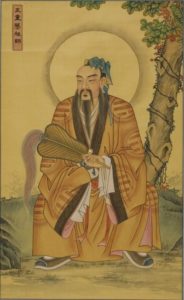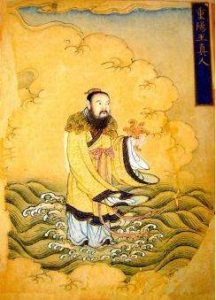Saints & Sages Part VI:
王重陽
Wang Chong Yang
(1113-1170)
_____________________________________

重阳全真。
开化辅极帝君。
-北五祖宝诰-
Double Yang – Complete Realization.
The Supreme Being of Opening Transformations &
Supporting the Bounded Finite [1].
-The Treasured Declaration of
The Northern Five Ancestors-
_____________________________________
Wang Chong Yang was the ancestral master [zu shi祖师] and founder of the Complete Realization School [2] [quan zhen全真] of Daoism, which is one of the two major schools, together with the Orthodox Unity, or Upright Oneness [zheng yi正一].He is revered as one of the Five Northern Founding Ancestors of Complete Realization [3] [quan zhen wu zu zhi yi 全镇五组之一]. His secular name was Zhong Fu [中孚] and his style name was Yun Qing [允卿]. Originally he was an imperial scholar in the Jin dynasty and later he became a military official. He changed his name to De Wei [德威], Virtous Mighty, and his style name to Shi Xiong [世雄]. Once he entered the Daoist gate his style name became Zhi Ming [知明], and his appellation Chong Yang Zi [重阳子], which is the reason why he is known as Wang Chong Yang. Wang Chong Yang [王重阳] was the disciple of Zhong Li Quan [钟离权], also referred to as Upright Yang [zheng yang 正阳] and Lü Dong Bin, also called Pure Yang [chun yang 纯阳]. Both teachers’ appellations contain Yang [阳] in their titles, thus, Wang Chong Yang was known by the name of Double Yang [chong yang 重阳]. He was also nicknamed Wang, the [One] gone Insane [wang hai feng 王害疯]. He was a resident of the capital’s Xian Yang prefecture’s Da Wei [京兆咸阳大魏 ], present day’s Shan Xi’s Xian Yang City Qin Du district [陕西咸阳市秦都区]. Seven of his disciples were important figures within the Daoist Gate, revered as the Seven Realized Ones [qi zhen七真].

Wang Chong Yang authored and left behind for posterity the following works; Wang Chongyang’s Collection on Complete Realization [wang chong yang quan zhen ji王重阳全真集], Wang Chongyang’s Treatise on Teachings & Transformations ([wang chong yang jiao hua pian王重阳教化篇 ], Wang Chong Yang’s Collection of Ten Transformations of Dividing the Pear [fen li shi hua ji王重阳分梨十化集] and Fifty Essays on Establishing the Teachings [li jiao wu shi lun立教五十论 ]. Recounted below is a paragraph from Wang Chongyang’s Collection on Complete Realization [wang chong yang quan zhen ji王重阳全真集], where Wang Chong Yang has a mystic encounter with one of the Eight Immortals:
余尝从甘河携酒一葫,欲归庵,道逢一先生叫云:‘害风,肯与我酒吃否?’余与之,先生一饮而尽,却令余以葫取河水;余取得水,授与先生,先生复授余,令余饮之,乃仙酎也。又曰:‘子识刘海蟾否?’余曰:‘但尝见画像
耳。’先生笑之而去。”还暗示所遇至人为刘海蟾。
I once carried a bottle gourd of wine from Gan He, [with] the desire to return to [my] hut. On the path [I] encountered a teacher who called out [to me]:
Insane [One], are you willing to consume alcohol with me or not?
I drank the cup in one gulp together with [this] teacher. However, he ordered me to fetch water with the gourd; [After] I had fetched the water and conferred [it] to the teacher, [he] once more commanded me to drink [it], consequently [it] was Immortal Wine [4]. [He] also said:
[Does] the son recognize Liu Hai Chan or not?
I said:
[I] have merely once seen a painted portrait [of him].
The teacher laughed and left. Even more so hinting that the person whom [I] had met was Liu Hai Chan.
It has been recorded that Wang Chong Yang quit drinking alcohol in the aftermath of this event.
[1] The word Bounded Finite [ji 极] in Chinese is also part of Tai Ji [太极], the Great Bounded Finite, and Wu Ji [无极] the Boundless Infinite.
[2] The name Complete Realization is often translated as Complete Reality or Complete Perfection. Taking a closer look Zhen [真] , it reveals the meaning of the Truth, a higher Truth. The author felt that reality in the English does not accurately reflect this concept and, therefore, chose a different terminology.
[3] The Five Northern Founding Ancestors of Complete Realization are Lü Dong Bin [吕洞宾], Zhong Li Quan [钟离权], Dong Hua Di Jun [东华帝君] , Liu Hai Chan [刘海蟾] and Wang Chong Yang [王重阳].
[4] Komjathy in Cultivating Perfection: Mysticism and Self-transformation in Early Quanzhen Daoism translated Immortal Wine [xian zhou 仙酎] as Brew of the Immortals. Zhou [酎] generally stands for repeatedly fermented, strong wine.
______________________________________________
Post-Scriptum: This article will appear in the appendix of Purple Cloud Press’ forthcoming publication of 《The 49 Barriers of the Cultivation of the Dao》 by Xing De, a manual for refining Inner Nature based on Liu Yiming’s 50 Barriers
